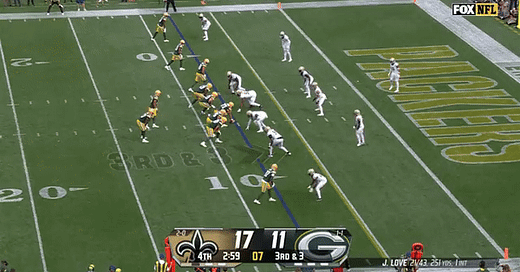The wide receiver market explosion will impact the Packers sooner than later
Green Bay doesn't have to pay any wide receivers this offseason, but that could change as soon as next year which raises the stakes for players like Christian Watson and Romeo Doubs.
Good morning!
They’re back! The Green Bay packers are back doing football things on the field and while there won’t be songs dedicated to all the lessons we learned already this spring, it’s a welcome reminder football is coming back to us. There’s plenty to wonder about off the field as well, with some key contracts coming up including and especially Jordan Love, but don’t miss the wide receiver market explosion.
Today's' edition of The Leap points out how the receiver market has ramifications for Green Bay’s roster of young receivers as well as Love’s extension.
Thank you for reading and supporting our coverage. You can also support our work by following us on social media:
Jason B. Hirschhorn: @by_JBH on Twitter / @byjbh@bsky.social on Bluesky / @by_jbh on Threads
Peter Bukowski: @Peter_Bukowski on Twitter / @peterbukowski@bsky.social on Bluesky / @peter_bukowski on Threads
The Leap: @TheLeapGB on Twitter / The Leap's YouTube channel
If you appreciate thoughtful, independent coverage of the Packers and NFL, please consider becoming a paid subscriber. Your support allows us to serve this community with the stories and reporting it deserves.
As always, thanks for making The Leap a part of your day.
What do Christian Watson/Romeo Doubs have to do to earn an extension?
Peter Bukowski: The Packers don’t tend to extend middling players. Dean Lowry’s contract stands as an obvious mistake in retrospect, while Lucas Patrick was a boon for Green Bay. When Russ Ball and Co. miss on outgoing free agents, it tends to be on players the Packers don’t view as core pieces, the kind of players worthy of top or at least top-of-market adjacent contracts.
See: Hyde, Micah and Hayward, Casey.
With the receiver market exploding, that puts an enormous amount of pressure on Christian Watson and Romeo Doubs given the investment at that position in the 2023 draft, as well as the arrival of Tucker Kraft and Luke Musgrave. How much is either of those players really worth?
And how will the expectations fit into negotiations? If Watson views himself as a WR1, he better produce like one and even then, the Packers will likely be leery of extending a player with his injury history. In some ways, Watson balling out this year complicates his future rather than clarifying it. If he’s awesome this year, he can credibly argue he deserves the Amon-Ra St. Brown deal for $27 million annually or more. And if he’s just OK, he still has the Marquez Valdes-Scantling Chiefs contract to point to. While that’s not the top of the market, it’s certainly more than, at least at this moment, his play on the field warrants with the requisite injury risks.
Whereas if he’s middling, scuttled by injuries once again, the Packers will move on without thinking twice.
Doubs may follow another former Packers contractual path: James Jones. After the Packers won the Super Bowl in 2010, Jones’ contract came up. Green Bay had Jordy Nelson, Donald Driver, and Greg Jennings on the roster.
Jones didn’t find the market he’d likely hoped for in free agency and returned to the Packers on a three-year deal. Don’t be surprised if something similar happens here. Doubs became the leader of the receiver room last year with Jayden Reed. The NFL values receivers at the top of the market, but has started to shy away from middle-class contracts more than in year’s past.
That could combine to set up Doubs for a cheap return, particularly if Dontayvion Wicks and Jayden Reed evolve as predicted.
How does this impact the Jordan Love negotiations?
PB: This is why you pay Jordan Love. If he’s not the kind of quarterback who can elevate the talent, weather some losses of depth, and still find success, then he’s not the kind of player worth giving $50+ million dollars.
That’s not to say don’t pay really good receivers when the team has the chance, but an elite quarterback papers over deficiencies when they pop up. We saw Love do that last year. Watson hurt half the year? He found a way to create explosives throwing to Jayden Reed in the slot or Romeo Doubs on the boundary. Dontayvion Wicks misses time, your middle-of-the-field monster, let Tucker Kraft (also filling in for the starter). get some love and facilitate the growth of Bo Melton, Malik Heath and others.
There’s already proof of concept with Love doing this. The youngest pass-catching group of the modern NFL, marked by two critical injury losses, produced at an elite level thanks in large part to the superlative play of Love. He steadied the Packers offensive ship.
Losing a Watson here — even if he has the potential to be an awesome player — or a Doubs there, won’t end his productivity. He’s shown that. And in doing so, put forth the best case he can for why he deserves the money in the first place.
Love will reset the quarterback market, and soon. Don’t be surprised if he’s the highest-paid player in the NFL come the Fourth of July. And if he is, that gives the Packers wiggle room to tell receivers in negotiations “We don’t need you.”
One cautionary word: that’s true, even with an elite quarterback, until it isn’t. The aforementioned James Jones had to come back and rescue an offense without Jordy Nelson in 2015. Allowing mid-tier receivers to walk rather than overpaying because of an elite quarterback is good practice, but only if there’s some sort of replacement plan. Green Bay didn’t always have one with Aaron Rodgers. They can’t make that mistake with Love too.




